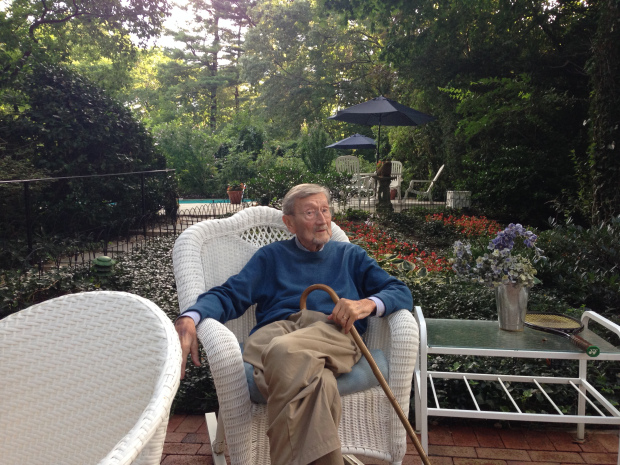My dear friend and colleague at the Kettering Foundation, with whom I edited the Kettering Review since 1991, passed away on August 20 at the age of 87. Snatched too young.

I took this picture in the summer of 2015, at the home he shared with his wife Carol Vollet Kingston. The Kettering Foundation has posted tributes to him here.
Here’s mine:
In the fall of 1988, when I was doing freelance work in Washington, DC, a friend called me at my row house in Adams Morgan to say that I was about to get a call from a Bob Kingston who was looking for a writer to work with something called the Kettering Foundation on something about democracy.
Sure enough, a few minutes later, sitting on the wooden staircase, I got a call from this very distinguished gentleman, speaking with a British lilt, with a tad of wry irony, about democracy and the foundation’s work—which all seemed rather vague but well-meaning—and would I meet him the next Tuesday, he asked, at the foundation’s Washington office?
I don’t really remember what he said at that Tuesday meeting but I distinctly remember him piling a stack of Kettering Reviews in my arms on the way out. A few days later I was flown to Dayton to meet with the president of the foundation, David Mathews, who took me on a tour of the foundation and then at the end of the day gave me an assignment to revise a speech of his for publication.
I seemed to be interviewing for something, but I had no idea what, nor did I know that this odd new-not-really-a-job job would be the most significant one of my entire life, that it would involve working out ideas with these people over many long meetings that I would almost always find fascinating, spirited debates over drinks and dinner about politics and public life, frequent ‘memo wars’ about things like virtue and purpose, and a far flung network of intellectuals and democratic practitioners all over the world.
A couple of years later, the lovely poet who had been Bob Kingston’s associate editor for the Review, Judd Jerome, passed away. And then Bob asked me if I’d like the job. Little did I know that this would be a role that I’d keep for the next 23 years, working with Bob issue by issue to say something that would help the foundation both with its own work and with its intellectual outreach. All the while I hoped that I’d never get promoted—for a promotion could only arise if something bad happened to Bob.
So I was not at all happy when two years ago, as Bob’s health began to fail, that I was promoted to coeditor. And now with his loss I find it surreal to be the sole editor. Yet, now when I take my pen to paper to mercilessly edit something for the Review, I mimic the curving lines he’d use to excise whole paragraphs; I try to link together the remaining words into the more concise little essay that the piece was waiting to become under Bob’s hand; I hope to carry on a bit of his brilliance.